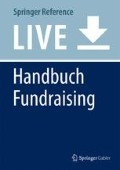Zusammenfassung
In der Nonprofit-Forschung gibt es zahlreiche Abhandlungen, die sich dem Thema Spenderakquisition und Fundraising widmen. Wissenschaftliche Erkenntnisse zu Fundraisern als Berufsgruppe sind dagegen eher rar. Der folgende Beitrag gibt einen Einblick in die Kompetenzen von Fundraiserinnen und Fundraiser und zeigt auf, welchen Stellenwert Kompetenzentwicklung im Fundraising einnimmt. In anderen Worten, der Beitrag konzentriert sich auf die Anwendung des sog. „Kompetenzorientierten Personalmanagement“ auf die Berufsgruppe der Fundraiser. Durchgeführt wurde eine Untersuchung bei 307 Fundraiserinnen und Fundraiser vornehmlich aus Deutschland, teils auch aus Österreich und der Schweiz, die Angaben zu folgenden Themenkomplexen machten: (1) Karriereeinstieg und relevante Kompetenzen, (2) Maßnahmen der Arbeitgeber zur systematischen Kompetenzentwicklung und (3) Wirkungen eines kompetenzorientierten Personalmanagement auf die Mitarbeiterzufriedenheit und -bindung der Organisation. Im Ergebnis zeigte sich, dass wenn Organisationen vermehrt Stellenwert auf kompetenzorientierte Maßnahmen und personalpolitische Entwicklungsmöglichkeiten bei ihren Mitarbeitenden legen, Beschäftigte zufriedener und dadurch auch gebundener an ihren Arbeitgeber sind. Damit zeigt die Studie wesentliche Handlungsfelder des Personalmanagement im Fundraising auf.
Literatur
Akingbola, K. 2013. A model of strategic nonprofit human resource management. Voluntas 24:214–240.
Athey, T., und M. Orth. 1999. Emerging competency methods for the future. Human Resource Management 38:215–225.
Audenaert, M., A. Vanderstraeten, D. Buyens, und S. Desmidt. 2014. Does alignment elicit competency-based HRM? A systematic review. Management Revue 25(1): 5–26.
Baran, M., und M. Klos. 2014. Competency models and the generational diversity of a company workforce. Economics & Sociology 7:209–217.
Bastida, R., F. Marimon, und L. Carreras. 2018. Human resource management practices and employee job satisfaction in nonprofit organizations. Annals of Public and Cooperative Economics 89:323–338.
Blackmar, J. und K. LeRoux. 2012. Enhancing learning and skill development among paid staff and volunteers in non-profit organizations. In Human Resource Management in the Nonprofit Sector: Passion, Purpose and Professionalism, 178–197. UK: Edward Elgar Publishing Limited
Bonder, A., C.-D. Bouchard, und G. Bellemare. 2011. Competency-based management – An integrated approach to human resource management in the Canadian public sector. Public Personnel Management 40(1): 1–10.
Breeze, B. 2017. The new fundraisers. Who organizes charitable giving in contemporary society? Bristol: Policy Press.
Deutscher Fundraising Verband. 2016. Berufsbild Fundraising. Berlin.
Ehlers, I. 2016. Personenbezogene Kompetenzen (Soft Skills). In Fundraising, Hrsg. 4. Aufl., 571–584. Wiesbaden: Fundraising Akademie.
Gangani, N., G. N. McLean, und R. A. Braden. 2006. A competency-based human resource development strategy. Performance Improvement Quarterly 19(1):127–140.
Helmig, B., und S. Boenigk. 2019. Nonprofit management, 2. Aufl. Vahlen, München.
Hollenbeck, G., M. McCall, und R. Silzer. 2006. Leadership competency models. Leadership Quarterly 17:398–413.
Jones, J. A., und E. A. Castillo. 2017. The fundraiser’s journey: A development informed, grounded theory analysis. International Journal of Nonprofit and Voluntary Sector Marketing 22(4): 1584–1593.
Levy, J. D. 2004. The growth of fundraising: Framing the impact of research and literature on education and training. New Directions for Philanthropic Fundraising 43:21–30.
Nathan, S., und E. R. Tempel. 2016. Fundraisers: Their careers, stories, concerns, and accomplishments. Presentation to the Association for Fundraising Professionals. Boston, MA.
Pousttchi, P., und A. Herrmann. 2001. Kompetenzorientiertes strategisches Management. Wirtschaftswissenschaftliches Studium 30:309–314.
Ridder, H.-G., und A. M. McCandless. 2010. Influences on the architecture of human resource management in nonprofit organizations. Nonprofit and Voluntary Sector Quarterly 39(1): 124–141.
Rodriguez, D., R. Patel, A. Bright, D. Gregory, und M. K. Gowing. 2002. Developing competency models to promote integrated human resource practices. Human Resource Management 41(3): 309–324.
Sanchez, R., und A. Heene. 1997. Reinventing strategic management: New theory and practice for competence-based competition. European Management Journal 15(3): 303–317.
Sargeant, A., und E. Jay. 2014. Fundraising management: Analysis, planning and practice, 3. Aufl. London: Routledge.
Sauter, W., und F.-P. Staudt. 2016. Strategisches Kompetenzmanagement 2.0. Wiesbaden: Springer Fachmedien Wiesbaden.
Shaker, G. G., und S. K. Nathan. 2017. Understanding higher education fundraisers in the United States. International Journal of Nonprofit and Voluntary Sector Marketing 22(4): 1604–1614.
Smith, Z. A. 2010. Assessing educational fundraisers for competence and fit rather than experience: A challenge to conventional hiring practices. International Journal of Educational Advancement 10(2): 87–97.
Tempel, E. R., und M. A. Duronio. 1997. The demographics and experience of fundraisers. New Directions for Philanthropic Fundraising 11:49–68.
Tempel, E. R., T. L. Seiler, und D. F. Burlingame. 2016. Achieving excellence in fundraising, 4. Aufl. Hoboken: Wiley.
Urselmann, M. 1998. Erfolgsfaktoren im Fundraising von Nonprofit-Organisationen. Wiesbaden: Deutscher Universitätsverlag.
Author information
Authors and Affiliations
Corresponding author
Editor information
Editors and Affiliations
Rights and permissions
Copyright information
© 2020 Springer Fachmedien Wiesbaden GmbH, ein Teil von Springer Nature
About this entry
Cite this entry
Boenigk, S., Dobberphul, K., Neukirchen, T. (2020). Kompetenzorientiertes Personalmanagement im Fundraising. In: Urselmann, M. (eds) Handbuch Fundraising. Springer Reference Wirtschaft . Springer Gabler, Wiesbaden. https://doi.org/10.1007/978-3-658-08461-5_33-1
Download citation
DOI: https://doi.org/10.1007/978-3-658-08461-5_33-1
Received:
Accepted:
Published:
Publisher Name: Springer Gabler, Wiesbaden
Print ISBN: 978-3-658-08461-5
Online ISBN: 978-3-658-08461-5
eBook Packages: Springer Referenz Wirtschaftswissenschaften

